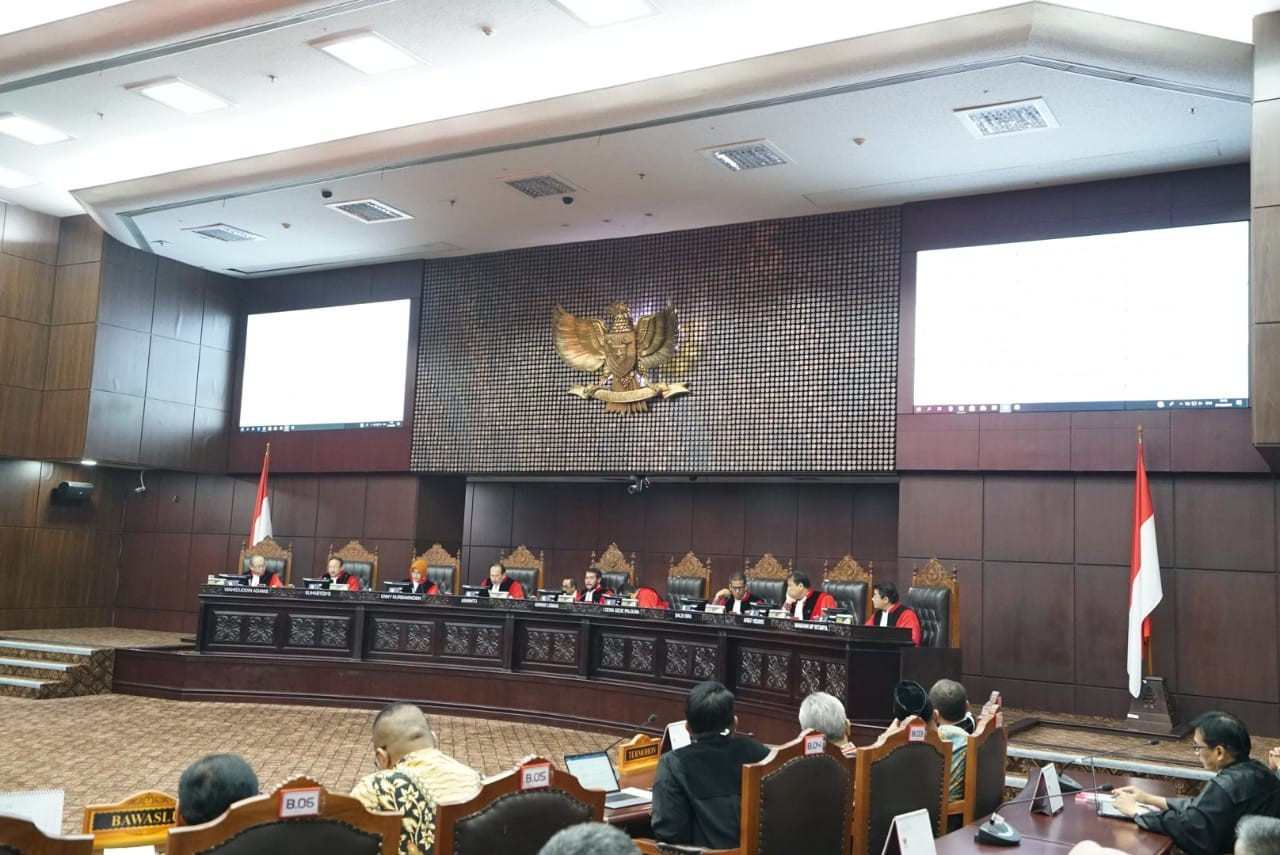News
Dual roles of deputy ministers raise legal, ethical concerns
Tenggara Strategics June 26, 2025 Justices of the Constitutional Court lead a hearing on the 2019 general and presidential elections at the court in Central Jakarta on June 27. (JP/Donny Fernando)
Justices of the Constitutional Court lead a hearing on the 2019 general and presidential elections at the court in Central Jakarta on June 27. (JP/Donny Fernando)
Some 25 deputy ministers in President Prabowo Subianto Prabowo Subianto Djojohadikusumo, 72, is a retired Army lieutenant general, a businessman and the incumbent Defense Minister (2019-present). Due to his proximity to power throughout his military career, he entered politics in 2004 to pursue his dream of becoming the nation’s president. 's bloated cabinet currently hold concurrent positions as commissioners in various state-owned enterprises (SOEs), which appear to be rewards for helping him win the presidential race last year. This practice raises serious concerns about conflicts of interest and the abuse of power, potentially harming the state for the benefit of a select few individuals or groups, in addition to possible legal violations.
Among those serving dual roles are Deputy Villages, Disadvantaged Regions and Transmigration Minister Ahmad Riza Patria, who is also a commissioner for state telco company Telkomsel; Deputy Environment and Forestry Minister Diaz Faisal Malik Hendropriyono, who serves as president commissioner of Telkomsel; and Deputy Immigration and Corrections Minister Silmy Karim, who is a commissioner at Telkom Indonesia. The situation is further complicated by some of these deputy ministers being active members of political parties within the governing coalition, such as Ahmad Riza of the Gerindra Party and Diaz of the tiny Justice and Unity Party (PKP).
This practice has sparked public controversy as it appears to contradict Constitutional Court Decision No. 80/2019, which prohibits state officials from simultaneously holding positions in state-owned or private enterprises. However, Presidential Communications Office chief Hasan Nasbi has defended the government’s policy, asserting that the court's ruling does not explicitly prohibit deputy ministers from holding such concurrent posts, thus, in his view, it does not violate the decision.
The issue was formally challenged before the Constitutional Court on May 5 by Juhaidy Rizaldy, executive director of Indonesia Law and Democracy Studies (ILDES). Juhaidy challenged Article 23 of the State Ministry Law, which prohibits ministers from concurrently serving as other state officials, commissioners or directors in state-owned or private enterprises, or leaders of organizations funded by the state and/or regional budgets.
Juhaidy argued that Constitutional Court Decision No. 80/2019 had already established that deputy ministers, being appointed by the president and serving roles equivalent to ministers, are subject to the same restrictions outlined in Article 23(b) of the State Ministry Law. Although not a criminal offense, Juhaidy emphasized that this inherent conflict of interest presents a serious vulnerability, particularly if unregulated, increasing the risks of power abuse.
This issue was previously raised in 2023 by anticorruption watchdog Indonesia Corruption Watch (ICW), which questioned the concurrent appointments of four deputy ministers and dozens of other ministry officials. At that time, the SOEs Ministry (34 individuals), Finance Ministry (18) and Public Works and Housing Ministry (nine) were cited for having the most bureaucrats in dual roles. Deputy ministers then serving as SOE commissioners included Rosan P. Roeslani (deputy SOEs minister) at Pertamina, Suahasil Nazara (deputy finance minister) at state-owned electricity company PLN, Muhammad Herindra (deputy defense minister) at PT Len Industri and Kartika Wirjoatmodjo (deputy SOEs minister) at Bank Rakyat Indonesia (BRI).
ICW argued that these dual roles violate Article 17(a) of Law No. 25/2009 on public services, which explicitly prohibits public servants from concurrently serving as commissioners or executives in business entities.
In 2023, Yeka Hendra Fatika, an Indonesian Ombudsman member, urged the government to address these "maladministration" cases to preserve public trust. The practice undeniably creates substantial potential for conflicts of interest and raises questions about officials' ability to effectively fulfill their public service responsibilities.
What we've heard
Officials at the Presidential Palace maintain that deputy ministers are allowed to hold multiple positions simultaneously. They cite a 2019 Constitutional Court ruling that found no prohibition against deputy ministers holding dual roles, stating that the ban applies only to "members of the cabinet."

